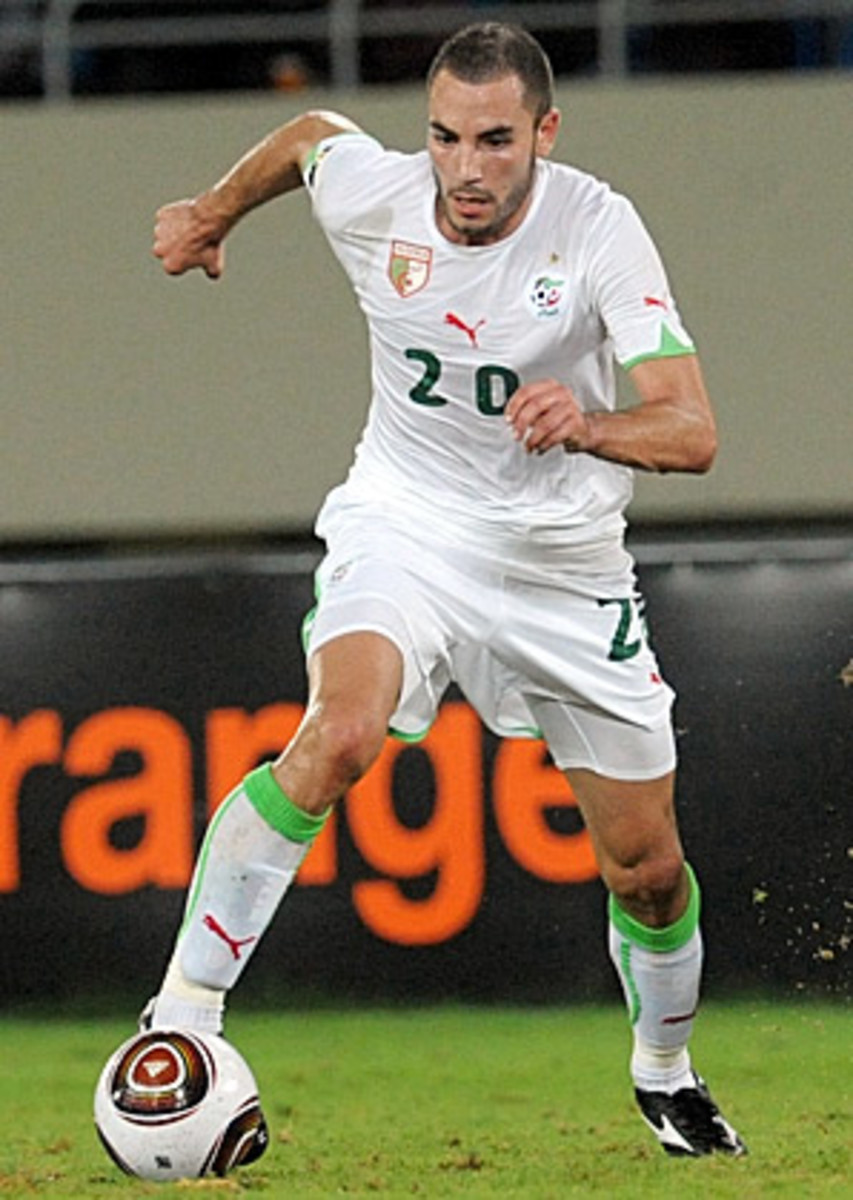Algeria not to be underestimated
Algeria is used to being written off, but that does not mean its players deserve it. The Algerian's opponents in next month's World Cup Group C, the United States among them, would do well to remember that.
"We are already outsiders in this World Cup and it's a position that suits us very well," Algeria midfielder Karim Matmour, a teammate of U.S. midfielder Michael Bradley's at Bundesliga side Borussia Moenchengladbach, told SI.com. "We are being underestimated, but we love causing surprises."
Algeria was eliminated from the 1982 competition only after one of the tournament's biggest scandals: West Germany and Austria played out a convenient 1-0 victory for the Germans that saw them both go through and Algeria, which had already beaten Chile 3-2, sent home on goal difference (thus missing a second-round match against rival France). Ever since, FIFA has ruled that the final group games be played simultaneously.
The 1982 side are heroes back in Algeria, not least Rabah Madjer, who went on to score with a famous back-heeled goal in Porto's 1987 European Cup win over Bayern Munich. Other luminaries include Lakhdar Belloumi, scorer of the winner against West Germany, and Salah Assad, top scorer in the 1982 campaign and the player credited with inventing el ghouraf (the spoon), a dribbling move in which a player scoops the ball around his marker.
"I was 5 when I first did it and now the Brazilians have made it their own," Assad told Algerian newspaper Le Buteur. "But what Ronaldinho and the others do now, we used to do in our sleep."
The Assad story has a tragic epilogue: He joined the Islamic Salvation Front, which opposed the government when civil war broke out in 1991, and soon after was taken from his home and imprisoned for four years. A family member told So Foot magazine that Assad was sent to the Ain-M'Guel jail, in the extreme southern Sahara, where he was tortured and witnessed several murders (he was also cut out of Algeria's highlights reels from 1982).
The golden generation also qualified for the 1986 World Cup, but this time internal conflicts ruined its chances. There was constant tension between the home-based players, like local hero Belloumi, and those who had supposedly abandoned their homeland to play in France. It did not help that the federation owed bonus money to the players, who then threatened to go on strike before the final match against Spain.
The common thread for Algeria's football success has been the coach, Rabah Saadane, who was in charge when the U-18s qualified for the 1979 Youth World Cup, Algeria's first participation in a major tournament. He was part of the 1982 backroom staff and head coach in 1986.
This is his fifth separate spell in charge of the team and arguably his most successful, given its arduous qualification process. When Algeria was drawn against reigning two-time African champions Egypt in the group stages, there were constant recalls to the battle of 1989, when Egypt's World Cup-qualifying win in Cairo kick-started a huge on-pitch brawl after the game. Belloumi, then still playing for Algeria, was alleged to have smashed a bottle in the face of an Egyptian doctor, blinding him in one eye. His international arrest warrant was dropped only last year as part of diplomatic efforts to ease tensions ahead of the matches. That didn't work.
After the two sides finished tied at the top and canceled each other out in the group games, they met in a controversial playoff last November. In Cairo, the Algerian team bus had been attacked with stones and bricks and three players emerged with bloodied faces. Egypt claimed the injuries were faked.
Algeria won the stormy playoff 1-0, and its place in South Africa was sealed. A subsequent 4-0 loss to Egypt in the African Cup of Nations semifinals, in which the Algerians had three players sent off (while Egypt went on to win its third straight tournament), was seen as no big deal with the World Cup prize already secured.
"It's in our psychology to defy authority; it comes from having lived under French rule for so long," Algeria-based reporter Nabil Djellit said. "We are a country of rebels and that means we are better as underdogs. We never collapse against big teams, but smaller teams could humiliate us. That's Algeria: from heroes to zeroes in a minute."
It was typical Algeria to lose 3-0 to minnow Malawi at the African Cup of Nations, and then go on to beat competition favorite Ivory Coast, captained by Didier Drogba, 3-2 in the quarterfinals.
Saadane named a 25-man preliminary squad last week and will cut two players by the end of the month. That time will be spent assessing the injuries to key men, including "Magic" Madjid Bougherra (Glasgow Rangers), Mourad Meghni (Lazio) and Nadir Belhadj (Portsmouth), and giving more playing time to Yazid Mansouri (Lorient) and Karim Ziani (Wolfsburg), who between them have started only 14 league matches this season.
If the Algerians achieve poor results in friendly matches against Republic of Ireland and UAE, then the cycle will begin again. The press and their opposition will write them off, and the team will once again have a point to prove.
"We have waited 24 years to be back among the elite of world football and we are not going home without a fight," Matmour said. "Our goal is to get out of the group and, with England favorites, that means our final match against USA could be a playoff to qualify. We will be ready for it."





